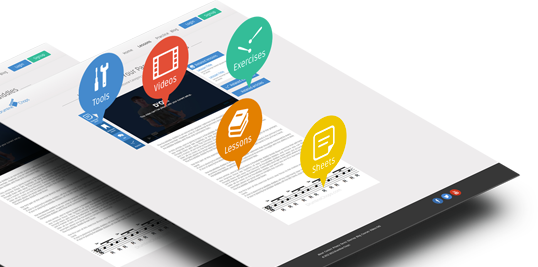
Do you want to keep your audience engaged throughout your entire performance? Do you want the crowd to go crazy over your show? If so, here are five easy ways to instantly become a better performer. Apply these methods to your playing and you'll leave the audience begging to see you perform again.
A lot of performers resort to looking down at the ground because they're either trying to figure out where they're going or because that's where they feel most comfortable looking. The problem with this is that looking down at the ground displays an unconscious sign of insecurity (either you don't know where you're going or you're not comfortable with what you're doing). To avoid giving off the impression that you're insecure or don't know where you're going, get your eyes up off the ground. Use your peripheral vision to gauge your intervals and look for yard lines off in the distance at the bottom of your visual plane. This will allow you to keep your eyes up and engaged with the audience.
You've put in a lot of practice into your show and are well prepared for your performance - show it! Don't dwell on what could go wrong. Instead, focus on what's going to go well and let that sense of confidence express itself through your performance. It's a simple mindset shift that makes a huge difference in the way you present yourself. If you don't think it does, watch other performers next time you're at a show and ask yourself who's performing the best. It's likely that your favorite performers will be the ones with the most confidence regardless of what they're playing.
Body language is an incredibly powerful form of communication. A smile or frown can add a lot of value to your overall performance because they're visual cues that your audience can relate to on a subconscious level. Convey the musical ideas the best that you can through your body language and you'll add another layer to your performance that will make a big difference.
We all have great performances but no one will ever have a 100% perfect performance (you're human - you're going to make mistakes). That being said, when a mistake happens, you have to be resilient and recover as quickly as possible. If you make a mistake and let it get to you, it will cause you to perform poorly for the remainder of the performance. People are going to catch on to that and know exactly what happened and then think less of your performance as a result. On the other hand, if you make a mistake and recover quickly, you'll continue performing throughout the entire event and most people probably won't even know that you made a mistake. It's a big difference that's completely in your hands to control.
It's fun to watch people who are having fun - it's even contagious to some degree. The more you enjoy what you're doing while you perform, the more it will be displayed in your body language and confidence. When those things are all at a high level, the crowd is going to love watching you which will make your experience even more enjoyable.
These are all relatively easy things that you can add to your playing today to improve your performance quality. If you've never done them before, they may feel a bit awkward or forced at first, but just as with your playing and marching, the more you practice them the more comfortable you'll get with them. Make sure that every time you rehearse or practice, you're reminding yourself of these things and making habits of them. That way, when show day comes around, you're fully prepared to perform for the audience and make the most out of the opportunity!



Pat McLaughlin is the founder of Drumline Chops. He graduated from the University of North Texas with a degree in music education and is currently the percussion director at West Bloomfield High School.